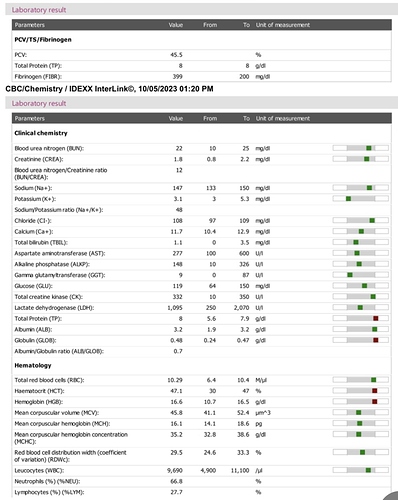Hi!
I would be interested in other’s advice as to if your horse has gone through this?
I recently had my mare’s bloodwork tested, her farm vet tested it a year ago to see what the kidney function is because she was debating trying Osphos. I remember her clearly saying that my mare’s kidney function was at the high end of normal so we decided against it. I never got the lab results so I followed up and finally received them.
When my horse was at a larger hospital for RenoVo injections recently, I asked the internal vet there to run her labs. He also said that her kidney function is at the high end of normal. He did some more comprehensive labs and emphasized that she drinks enough water. In the earlier labs, she may have been dehydrated.
I emailed the internal vet at the hospital after our visit, he suggested that my mare get a red mineral salt lick, which she hasn’t shown much interest in. He seemed to think that the red one was better than the white salt or the Himalayan. He also suggested that we moisten her food as a mash, to add water, we do that twice a day and she loves it! He was pleased with her weight. He didn’t think that we need to change her hay, and I had read that omega oils can help with chronic kidney disease, which she does not have yet, but he didn’t think supplementing that would be necessary, she does get flax seed oil with some omegas in it.
Making sure that her water doesn’t freeze over this winter in outside turnout will be the biggest challenge, because she has full time turnout. I have been investigating trying to get a water bucket where I could add insulation around it. We don’t have access to electricity outside so I think it would most likely be either- an insulated water bucket, putting plastic bottles with salt in the water to break up the ice, I have looked into trying to find a solar heater, hard to find. We can use stalls if necessary, but the most likely option that way would be self care or partial care, full care stall board really isn’t an option here.
I’d be interested in knowing how you have dealt with elevated kidney issues… what did you do to manage it? I have had my mare for almost 2 years and while I don’t know all of her history, she does have knees that are injured from some type of use, sad to say but I can’t help but wonder if the kidney issues came about if previous owners were giving medication to try to get her to be more sound. Not sure… but a thought.
Many thanks




 didn’t think about the search and destroy tactic!!! I’m not sure of any of this, just a list of things I found online. And then there is freezing temps and FREEZING temps depending on where your winter is.
didn’t think about the search and destroy tactic!!! I’m not sure of any of this, just a list of things I found online. And then there is freezing temps and FREEZING temps depending on where your winter is.